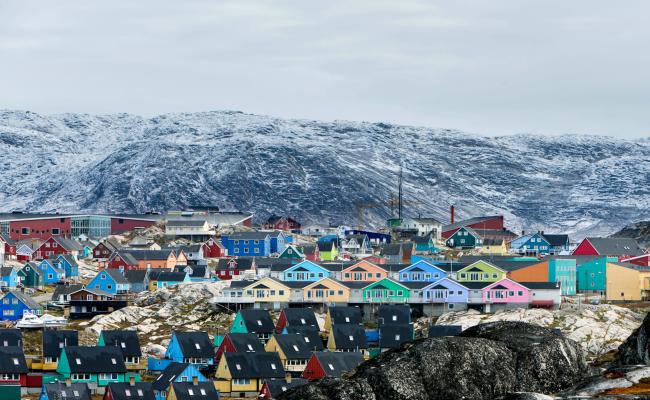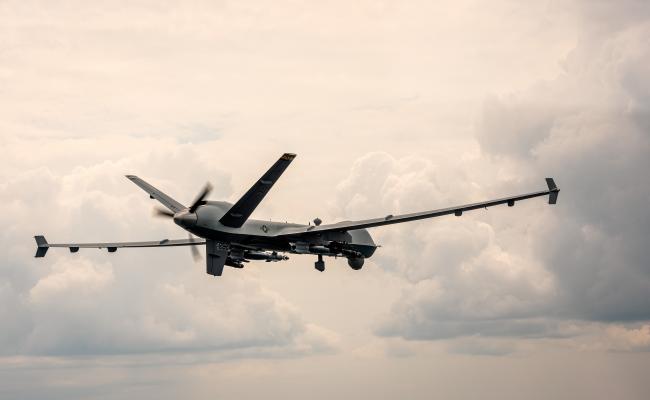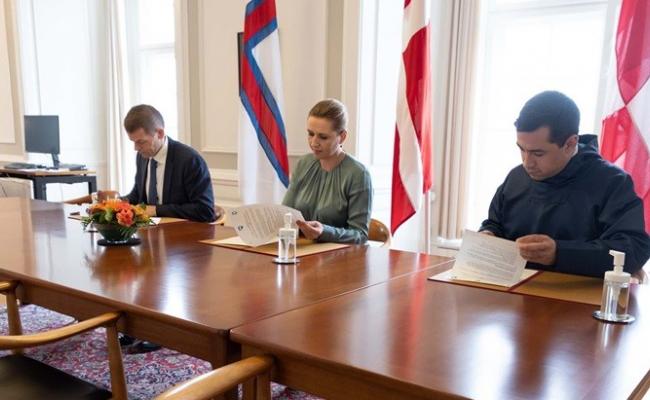The EU Enters Into New Era of Cooperation With the Faroe Islands and Greenland
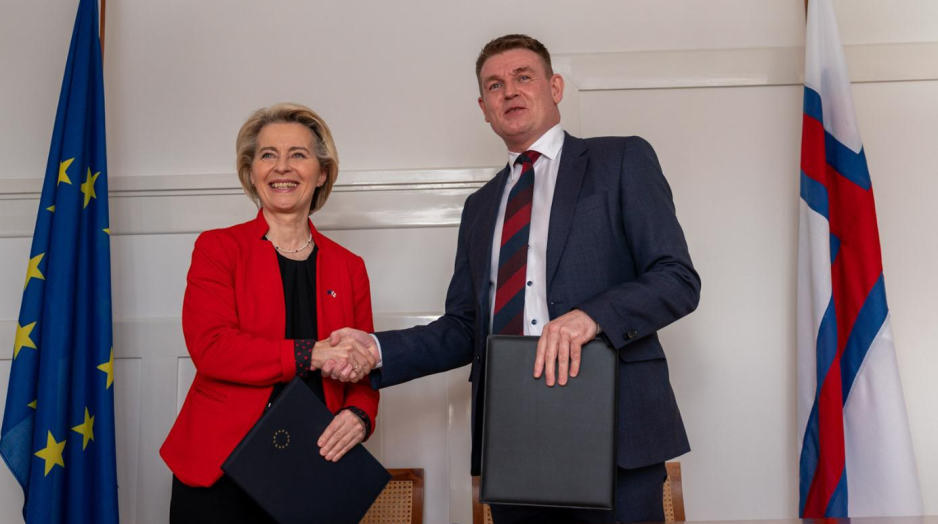
On Thursday, the EU Commission President, Ursula von der Leyen, and Faroe Islands' PM Aksel Johannesen signed a letter of intent, which will form the framework for a closer and extended partnership. (Photo: Bjarni Árting Rubeksen/the Government of the Faroe Islands)
The EU Commission President, Ursula von der Leyen, recently visited the Faroe Islands and Greenland to form closer ties between the union and the countries' self-government authorities. Several agreements were signed, and von der Leyen officially opened the EU's new office in Nuuk.
Last week, Ursula von der Leyen traveled to the North Atlantic to strengthen the EU's presence in this part of the Arctic.
Von der Leyen is president of the European Commission, the EU's politically independent executive arm. On Thursday, she was the first person in this position to ever visit the Faroe Islands.
In Tórshavn, the Faroese PM Aksel Johannesen (Javnaðarflokkurin) and von der Leyen signed a memorandum of understanding (MoU), marking a milestone in the relationship between the Faroe Islands and the EU.
"The Faroe Islands belong to the wider European family. Today, we are opening a new chapter in our economic and our political cooperation," she says.
The agreement outlines deepened cooperation between the parties in trade, fisheries and research – as well as extending the cooperation to fields such as the green and the digital transition.
"The effort to enhance relations between the Faroe Islands and the EU has been ongoing for several years, but today is the start of a new era of our collaboration. The changing global context makes it increasingly important to align closely with like-minded partners. The MoU will serve as a foundation for enhancing our cooperation with the EU," Johannesen states.
The MoU between the Faroe Islands and the EU
– The participants confirm that they intend to strengthen existing cooperation and develop interaction in new areas through regular consultations. Consolidating and broadening the relationship is of mutual interest “in the current international geopolitical context”, it is noted.
– The agreement lists ten areas of cooperation in the following order: trade; research and scientific cooperation; fisheries; climate change, environment and energy; Arctic matters; marine biodiversity; green and digital transition; food security; taxation – as well as education, culture, youth, and tourism.
– On the topic of Arctic matters, it is pointed out that the Faroe Islands and EU have a basis for cooperation on shared objectives, e.g. sustainable development, including in infrastructure (with a focus on blue economy sectors), research and innovation, civil protection and safety (particularly at sea), and environmental protection.
– The participants also express a joint objective of supporting the work of the Arctic Council and other multilateral cooperation in the Arctic region – as well as collaborating on the transition to an efficient and renewable energy system, counteracting the negative impacts of climate change, and reducing critical emissions.

“The Faroe Islands are well placed to benefit from hydropower, wind and tidal energy. I am confident that the country will achieve its goal of sourcing all land electricity from sustainable supplies by 2030,” Ursula von der Leyen maintains. During her stay in the Faroe Islands, she visited the inter-municipal power company SEV, which she describes as a local leader in sustainable energy production. (Photo: Bjarni Árting Rubeksen/the Government of the Faroe Islands)
The situation in the North Atlantic
Von der Leyen also thanks the Faroe Islands for its efforts to align on the EU's sanctions against Russia. The country is not a member of the EU and, therefore, not bound by the union's stance on sanctions, but it has chosen to implement similar measures.
"I know that it comes at a cost for the Faroe Islands, which makes us more impressed by your clear stance. Rest assured, we stand by your side in this matter."
With this, the Commission president likely refers to the Faroese port ban on Russian vessels, which was introduced in 2022 and further tightened last year, among other things.
"Allow me a word on our shared region, the North Atlantic. It is a focal point, of course, for trade, military operations, and, more than ever, geopolitical competition," she says and continues:
"So your position is eminently strategic. You are a gateway to the Arctic, and climate change is not the only challenge anymore. We know that countries like Russia and China are increasingly assertive."
"This could impact the stability of the region and the broader European neighborhood. This is why we must strengthen our political partnership. We stand together for the Arctic to remain a peaceful and safe region. We are like-minded partners bound by shared values and ties of trade and trust. I am very glad that we are taking our cooperation now to the next level."
Significant investments in Greenland
On Friday, the EU Commission president's voyage continued to Greenland, where she officially opened the EU's new representative office in Nuuk.
"The fact that the EU is opening an office in Greenland shows that you cannot get around us. We have cooperated with the EU for several years, and the opening of its office will entail an even closer collaboration – surely based on our laws and wishes. Nothing about us without us," states Múte Bourup Egede, the Greenlandic Prime Minister (Naalakkersuisut Siulittaasuat).
The office is established as part of the EU Arctic Policy, and has its background in geopolitical assessments, as well as a desire for better understanding of and cooperation with Greenland.
The aim is to facilitate collaboration between the EU and Greenland's government (Naalakkersuisut), the private sector and civil society; promote EU public and private investments in Greenland – as well as deepen cooperation in fields such as education, renewable energy, critical raw materials, and the protection of biodiversity. That is stated by the EU Commission.
Von der Leyen and Egede also signed two cooperation agreements totalling almost 94 million Euros under the EU investment strategy "Global Gateway."
"Our new office in Nuuk marks the beginning of a new era of the EU-Greenland partnership, with Europe's concrete presence in Greenland and the wider Arctic region. With our two new agreements, we will invest in clean energy, critical raw materials, and skills in Greenland. New jobs in Greenland, better security of supply for Europe; we can both benefit from greater cooperation in these areas," she says.
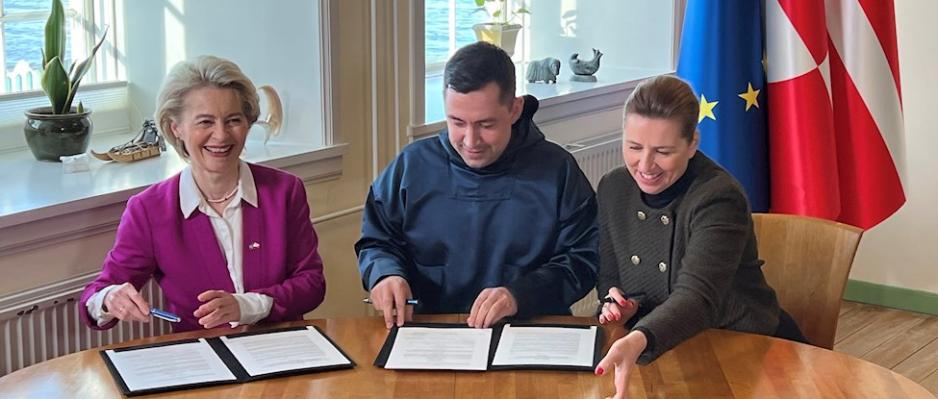
The EU Commission President Ursula von der Leyen and Greenland's PM Múte Bourup Egede signed cooperation agreements between the union and Greenland regarding education and green development. Denmark's PM Mette Frederiksen participated in the meeting. (Photo: Naalakkersuisut)
The new EU-Greenland cooperation agreements
– Agreement on an education program: The EU grants €71.25 million to improve the quality of Greenland’s education sector in order to empower the youth and provide the workforce with skills needed for strategic economic sectors. Focus on vocational and technical education, innovative skills in primary education as well as support for young people who need help finding their way back to education or work.
– Agreement on a green growth program: The EU will invest €22.5 million in energy and critical raw materials value chains, environmental preservation, and research. This is intended to help diversify Greenland's economy and develop strategic industries, such as the production of clean hydrogen.
Emphasis on the security policy situation
Von der Leyen traveled to the Faroe Islands and Greenland together with Denmark's PM Mette Frederiksen (Social Democrats). The two countries are self-governed parts of the Danish Commonwealth.
"I am happy about the new agreement signed [between the Faroe Islands and the EU, ed. note]. Strengthened cooperation is important, as well as the Faroe Islands coming closer to the EU," states Frederiksen and continues:
"Greenland and the EU need to collaborate closely, particularly given our current security policy situation. We are strengthening this with a new EU office in Nuuk."



